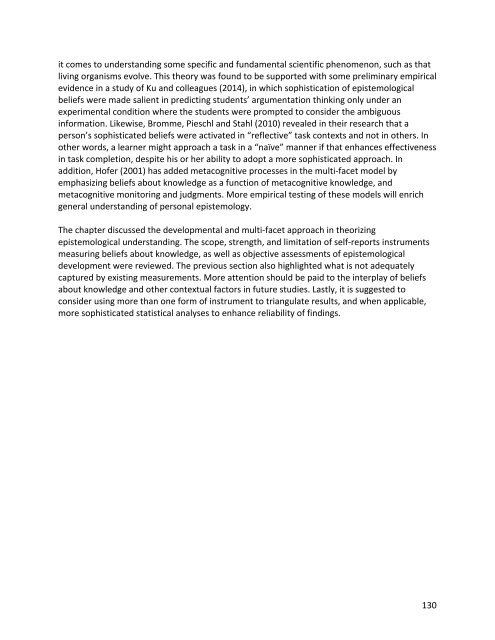A COMPENDIUM OF SCALES for use in the SCHOLARSHIP OF TEACHING AND LEARNING
compscalesstl
compscalesstl
You also want an ePaper? Increase the reach of your titles
YUMPU automatically turns print PDFs into web optimized ePapers that Google loves.
it comes to understand<strong>in</strong>g some specific and fundamental scientific phenomenon, such as that<br />
liv<strong>in</strong>g organisms evolve. This <strong>the</strong>ory was found to be supported with some prelim<strong>in</strong>ary empirical<br />
evidence <strong>in</strong> a study of Ku and colleagues (2014), <strong>in</strong> which sophistication of epistemological<br />
beliefs were made salient <strong>in</strong> predict<strong>in</strong>g students’ argumentation th<strong>in</strong>k<strong>in</strong>g only under an<br />
experimental condition where <strong>the</strong> students were prompted to consider <strong>the</strong> ambiguous<br />
<strong>in</strong><strong>for</strong>mation. Likewise, Bromme, Pieschl and Stahl (2010) revealed <strong>in</strong> <strong>the</strong>ir research that a<br />
person’s sophisticated beliefs were activated <strong>in</strong> “reflective” task contexts and not <strong>in</strong> o<strong>the</strong>rs. In<br />
o<strong>the</strong>r words, a learner might approach a task <strong>in</strong> a “naïve” manner if that enhances effectiveness<br />
<strong>in</strong> task completion, despite his or her ability to adopt a more sophisticated approach. In<br />
addition, Hofer (2001) has added metacognitive processes <strong>in</strong> <strong>the</strong> multi-facet model by<br />
emphasiz<strong>in</strong>g beliefs about knowledge as a function of metacognitive knowledge, and<br />
metacognitive monitor<strong>in</strong>g and judgments. More empirical test<strong>in</strong>g of <strong>the</strong>se models will enrich<br />
general understand<strong>in</strong>g of personal epistemology.<br />
The chapter discussed <strong>the</strong> developmental and multi-facet approach <strong>in</strong> <strong>the</strong>oriz<strong>in</strong>g<br />
epistemological understand<strong>in</strong>g. The scope, strength, and limitation of self-reports <strong>in</strong>struments<br />
measur<strong>in</strong>g beliefs about knowledge, as well as objective assessments of epistemological<br />
development were reviewed. The previous section also highlighted what is not adequately<br />
captured by exist<strong>in</strong>g measurements. More attention should be paid to <strong>the</strong> <strong>in</strong>terplay of beliefs<br />
about knowledge and o<strong>the</strong>r contextual factors <strong>in</strong> future studies. Lastly, it is suggested to<br />
consider us<strong>in</strong>g more than one <strong>for</strong>m of <strong>in</strong>strument to triangulate results, and when applicable,<br />
more sophisticated statistical analyses to enhance reliability of f<strong>in</strong>d<strong>in</strong>gs.<br />
130


